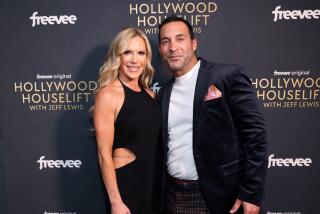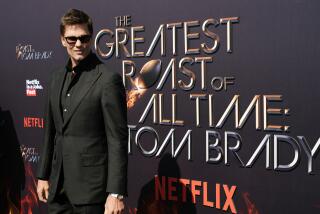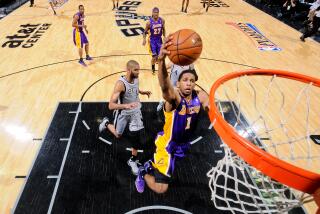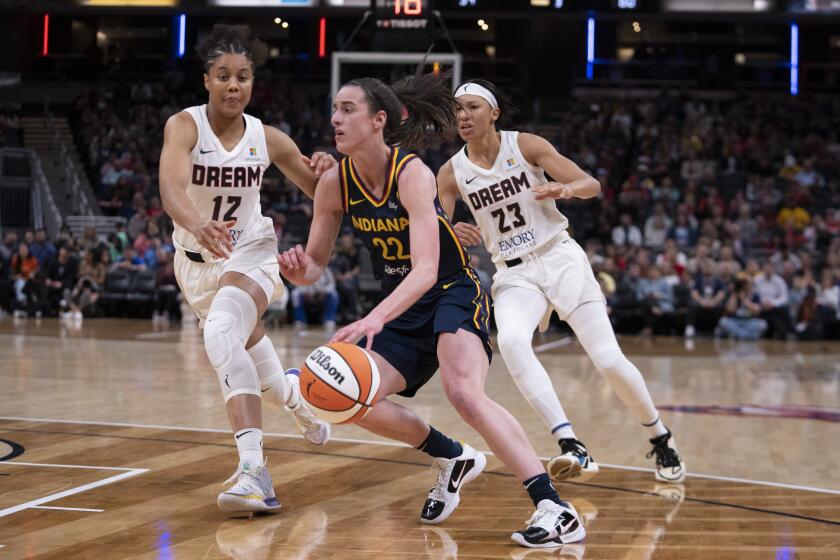Jury’s Out
Penn State Coach Joe Paterno deserves the benefit of the doubt in the Rashard Casey case because, frankly, he has earned it.
But, let this be said: Paterno had better be right on this, or he risks impugning a reputation that has been more than three decades in the making.
People tend to remember your last acts; Woody Hayes belting a Clemson kid, Frank Kush whacking his punter.
If you think it ludicrous that Paterno’s broad strokes over a college canvas could be judged on one decision made in his 73rd year, well, you obviously are a stranger to sports-talk radio.
We only hold Joe Paterno to a higher standard because he has held himself, and his school, to one.
It was Paterno, not Barry Switzer, who once said “success without honor is an unseasoned dish.”
Here is what Paterno now picks at on his plate:
His star quarterback, Casey, was arrested May 14 on second-degree felony charges. Police say Casey and a friend beat an off-duty cop unconscious at a Hoboken, N.J., bar.
Casey says he’s innocent, Paterno believes him, so Casey will start Sunday when Penn State plays USC at the Meadowlands.
What’s at stake for Paterno?
More, perhaps, than he wants to know.
This was supposed to be the carriage ride of Paterno’s illustrious career. He needs seven victories to eclipse Bear Bryant’s major college record of 323.
Instead of a coronation, however, Paterno lurches toward Bear’s mark under scrutiny.
Remarkably, Paterno has not flinched.
“I’m gonna play Rashard Casey until something convinces me I shouldn’t,” Paterno said at Big Ten media day.
Felony charges notwithstanding?
“I’m not a lawyer,” he said.
This is a departure, at worse a hypocritical turn, for Paterno.
This week, Paterno reiterated: “I don’t think there’s anything for me to be perplexed about.”
One cannot discount how much Paterno needs Casey in the lineup to reach the seven wins he needs to break Bryant’s record.
This does not appear to be one of Paterno’s stronger teams. The Nittany Lions lost nine of 11 starters on defense and the backup quarterback, Matt Senneca, is inexperienced.
Paterno says he doesn’t care about breaking Bryant’s record, but how does this look?
Former Nebraska coach Tom Osborne drew considerable ire for playing troubled tailback Lawrence Phillips in the 1996 Fiesta Bowl, but Osborne did not need Phillips to win as much as Paterno needs Casey.
Florida State Coach Bobby Bowden drew flak last year when he reinstated receiver Peter Warrick after an arrest on felony shoplifting charges, but Bowden did not need Warrick as much as Paterno needs Casey.
You almost understand why Bowden would capitulate; he’s an old-boys’ coach who openly yearns for days when off-the-field problems were settled between a head coach and the chief of police.
You even understand why Osborne put his neck on the line by enlisting more questionable players in his later years. After seven consecutive bowl losses from 1988-94, Osborne’s image was that of hard-luck loser.
He calculated the cost to his reputation to that of his legacy and ended up with three national titles, helped in part by a cast of shady characters that included Phillips, Christian Peter, Riley Washington and Ty Williams.
But why would Paterno take the chance?
For 34 years, at the same school, he has operated under a different premise. Ivy League-educated, Paterno embarked on a quixotic quest to prove “student-athlete” did not have to be an oxymoron.
Paterno thought you could have it all: national titles, quality players, high graduation rates. While he has won two national titles and led four other teams that were undefeated but uncrowned, Paterno also has donated millions of his own money to the school.
The Boston Globe once described Paterno as “The Voice of Ethics,” and he probably is the only coach to have Ibsen on his bookshelf.
Paterno dubbed Penn State his “Grand Experiment.”
He was never a saint, much more complex and brooding than the packaged images, but in the dirty business of college football he probably has been best described as a “water lily in the cesspool.”
Two years ago, sitting in his Tallahassee office, Bowden said he thought Paterno would one day stand above the rest.
“Joe has done everything right,” Bowden said. “He graduates his players, he’s articulate and his character is impeccable.”
That’s why Paterno’s handling of Casey remains puzzling.
Paterno has always been a hard liner.
At the 1971 Cotton Bowl, he demoted Franco Harris for showing up late to a practice.
At the 1991 Fiesta Bowl, Paterno suspended three starters for subpar grades, even though the players were eligible by NCAA standards.
Paterno once benched linebacker Mac Morrison for using a fake ID at a campus bar and suspended receiver Bobby Ingram an entire season for allegedly stealing a stereo.
Yet, Paterno insists he has not compromised his standards with Casey?
“I don’t think I’ve become more or less sympathetic,” he said at Penn State’s media day. “I treat each case on its own merit.”
He obviously thinks Casey’s case has merit.
Part of the problem in college football is that disciplining players is arbitrary--there is no commissioner’s office to levy justice under an umbrella policy.
When Warrick faced felony charges last year, Florida State’s rules required that he be suspended.
It was only after the charge was reduced to a misdemeanor that Bowden had the power to rush Warrick back for the balance of the Seminoles’ national championship charge.
More than a dozen colleges forbid players from playing with felony charges pending.
You would think Penn State would be one of them.
“There’s no manual,” Arizona State Coach Bruce Snyder says. “There’s no guideline on this kind of thing. You can’t turn to page 64 and say, ‘This covers that one.’ ”
Snyder faced his own crisis this summer when his quarterback, Ryan Kealy, was arrested for driving under the influence. Snyder suspended Kealy.
If Kealy is convicted of misdemeanor charges, he must, under Arizona State’s code of conduct policy, miss one week of practice and one game.
Is Snyder right and Paterno wrong?
“Joe Paterno has been doing this a lot longer than I have,” Snyder says. “I trust he knows what he is doing.”
Should the rest of us trust in Joe?
There are three scenarios facing Casey: If Hudson County prosecutors forward the second-degree assault charges to a grand jury, the outcome may not be known until late October.
Can you imagine Casey being indicted the week Paterno is set to break Bryant’s record?
The Casey case also could be reduced to a misdemeanor, or a plea bargain could be reached.
If Paterno knows more than we know, perhaps he can afford to be righteous.
Why, without due process, should his quarterback not be allowed to play?
But if Paterno is wrong, the way Osborne was wrong about Phillips, Paterno’s image will suffer.
It is a risk Paterno did not have to take.
Paterno has prohibited Casey from discussing his case with the media.
“I have told him it is ridiculous to get into long discussions of ‘What is going to happen if . . . ?’ ” the coach said.
Casey appears eager to get his story out.
“I don’t think I have anything to hang my head over,” he said recently. “If I could talk, I’d talk. . . . I’m not ashamed of anything.”
In Michael O’Brien’s biography of Paterno, “No Ordinary Joe,” the author writes: “Joe demonstrates how to win without compromising important principals as many of our country’s ‘leaders’ have done in their pursuit of winning.”
Yep, that has been the book on Paterno.
Until now?
Paterno was an English literature major at Brown. One of his favorite passages is the Robert Browning quote, “Man’s reach should exceed his grasp.”
Only time will tell in the Casey case whether Paterno has reached too far.
More to Read
Get our high school sports newsletter
Prep Rally is devoted to the SoCal high school sports experience, bringing you scores, stories and a behind-the-scenes look at what makes prep sports so popular.
You may occasionally receive promotional content from the Los Angeles Times.







